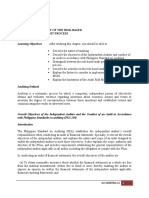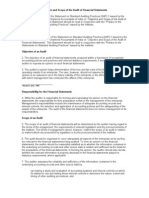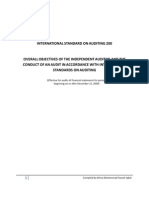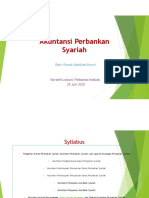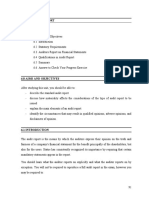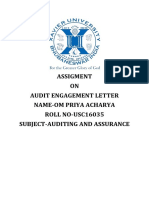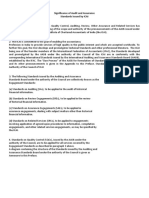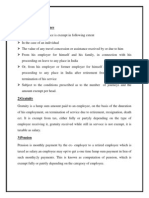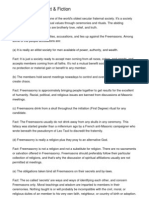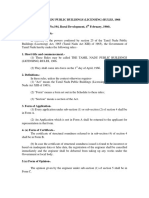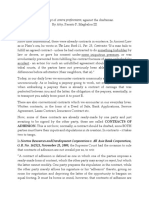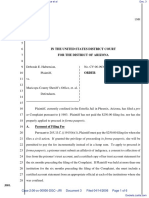What Are Accounting Standard
What Are Accounting Standard
Uploaded by
Shankari MaharajanCopyright:
Available Formats
What Are Accounting Standard
What Are Accounting Standard
Uploaded by
Shankari MaharajanOriginal Description:
Original Title
Copyright
Available Formats
Share this document
Did you find this document useful?
Is this content inappropriate?
Copyright:
Available Formats
What Are Accounting Standard
What Are Accounting Standard
Uploaded by
Shankari MaharajanCopyright:
Available Formats
WHAT ARE ACCOUNTING STANDARD Accounting standard represents a codification of the best practices in the field of auditing.
Auditing standards are therefore, the performance benchmarks for the auditors. Auditing standards contain guidance for the professionals on how they carry out their professional engagements. They cover the basic principles and essentials procedures to apply those basic principles that relates to the judgment or behavior. Auditing standards are framed to ensure probity, integrity and quality in the professional's work, essential for ensuring the confidence of the society in the financial information being reported by the business enterprises. NEED FOR ACCOUNTING STANDARDS. Accounting standards play a critical role in Ensuring application of accepted financial reporting standards thereby lending credibility and wider acceptability to the financial statements. Providing benchmark against which the performance of the members can be measured and evaluated at global level also. Ensuring compliance with the applicable legislative and regulatory framework. Ensuring right approach of the professionals in complex/ emerging areas of audit. Ensuring consistency and quality in the work performed by the professionals
SA AND OBJECTIVES OF AUDIT FS( financial statements) in accordance with financial reporting framework: The standard on auditing are formulated by the ICAI in the context of an audit of financial statements by an independent auditor. the objective of an audit of financial statements is to enable the auditor to express an opnion whether the financial statements are prepared, in all material aspects, in accordance with an application financial reporting framework. it is undertaken to enhance the degree of confidence of intended users in the financial statements. the standards on auditing, taken together, provide the standards for the auditors work in fulfilling the objective. FS free from material misstatements;
In conducting an audit, the overall objective of the auditor is to obtain reasonable assurance about whether the financial statement as a whole are free from material misstatement, whether due to fraud or error, and to report on the financial statements in accordance with the auditor's findings. Owing to the inherent limitations of an audit, there is an unavoidable risk that some material misstatements of the financial statements will not be detected, even though the audit is properly planned and performed in accordance with the SA's. In all cases, when this overall objective has not been or cannot be achieved, the SA's require the auditor to modify the auditor's opinion accordingly or withdraw from the engagement as may be appropriate, depending upon the facts and circumstances of each case engagement as may be appropriate, depending upon the facts and circumstance sin each case.
OBJECTIVES The objectives of the auditor are to: (a) Form an opinion on the financial statements based on an evaluation of the conclusions drawn from the audit evidence obtained; and (b) Express clearly that opinion through a written report that also describes the basis for the opinion. DEFINITIONS For purposes of the SAs, the following terms have the meanings attributed below: General purpose financial statements Financial statements prepared in accordance with a general purpose framework General purpose framework A financial reporting framework designed to meet the common financial information needs of a wide range of users. The financial reporting framework may be a fair presentation framework or a compliance framework. The term fair presentation framework is used to refer to a financial reporting framework that requires compliance with the requirements of the framework and: Acknowledges explicitly or implicitly that, to achieve fair presentation of the financial statements, it may be necessary for management to provide disclosures beyond those specifically required by the framework; or
Acknowledges explicitly that it may be necessary for management to depart from a requirement of the framework to achieve fair presentation of the financial statements. Such departures are expected to be necessary only in extremely rare circumstances. The term compliance framework is used to refer to a financial reporting framework that requires compliance with the requirements of the framework, but does not contain the acknowledgements in (i) or (ii) above
Unmodified opinion The opinion expressed by the auditor when the auditor concludes that the financial statements are prepared, in all material respects, in accordance with the applicable financial reporting framework9 Reference to financial statements in this SA means a complete set of general purpose financial statements, including the related notes. The related notes ordinarily comprise a summary of significant accounting policies and other explanatory information. The requirements of the applicable financial reporting framework determine the form and content of the financial statements, and what constitutes a complete set of financial statements. Reference to Financial Reporting Standards in this SA means the Accounting Standards promulgated by the Accounting Standards Board (ASB) of the Institute of Chartered Accountants of India (ICAI) or Accounting Standards, notified by the Central Government by publishing the same as the Companies (Accounting Standards) Rules, 2006, or the Accounting Standards for Local Bodies promulgated by the Committee on Accounting Standards for Local Bodies (CASLB) of the Institute of Chartered Accountants of India, as may be applicable. REQUIREMENTS SHALL: The requirements of each SA are contained in a separate section and expressed using the word "shall". COMPLIANCE: THE auditor complies with the requirement of an SA in all cases where they are relevant in the circumstances of the audit. NON-COMLIANCE: the auditor is not required to comply with a requirement that is not relevant in the circumstances of the audit and this does not constitute a departure from the requirement. However the auditor should document the steps undertaken by him to satisfy
himself that the process adopted in the circumstances of the audit assisted him in achieving the overall objective. DEPARTURE: In exceptional circumstances, the auditor may judge it necessary to depart from a relevant requirement by performing alternate audit procedures to achieve the aim of that requirement. The need for the auditor to depart from a relevant requirement is expected to arise only where the requirement is for a specific procedure to be performed and, in the specific circumstances of the audit, that procedure would be ineffective. When it is necessary for the auditor to depart from a requiremnt of an SA, the auditor is required to document how alternative procedures performed achieve the aim of the requirement, and, the reasons for the departure. auditor's report also should draw attention to such departures. However, a mere disclosure in his report does not absolve an auditor from complying with the applicable standard.
You might also like
- Patriotic SongDocument9 pagesPatriotic SongShankari MaharajanNo ratings yet
- LABOR STANDARDS: Working Conditions and Working PeriodDocument4 pagesLABOR STANDARDS: Working Conditions and Working Periodchisel_159No ratings yet
- Legal ProfessionDocument5 pagesLegal ProfessionBasri JayNo ratings yet
- Orginal AuditingDocument26 pagesOrginal AuditingShankari MaharajanNo ratings yet
- CA Khushroo-B - PanthakyDocument46 pagesCA Khushroo-B - PanthakyCA Kamal RajpurohitNo ratings yet
- CAS 200 Overall ObjectivesDocument29 pagesCAS 200 Overall ObjectiveszelcomeiaukNo ratings yet
- HFHGFHGHDGSFDHDGGFGDocument31 pagesHFHGFHGHDGSFDHDGGFGbabylovelylovelyNo ratings yet
- HFHGFHGHDGSFDHDGGFGDocument31 pagesHFHGFHGHDGSFDHDGGFGbabylovelylovelyNo ratings yet
- A 6.4 Audit Unit 5Document7 pagesA 6.4 Audit Unit 5Gaurav MahajanNo ratings yet
- 2009 Auditing Handbook A008 ISA 200Document30 pages2009 Auditing Handbook A008 ISA 200RedaBendimeradNo ratings yet
- At 1 Overview of AuditingDocument7 pagesAt 1 Overview of AuditingRaeiounah JeonNo ratings yet
- SA200Document35 pagesSA200Laura D'souzaNo ratings yet
- Accounting 16aDocument93 pagesAccounting 16aLelouch BritanianNo ratings yet
- Isa 700Document22 pagesIsa 700baabasaamNo ratings yet
- SLAuS 700 PDFDocument9 pagesSLAuS 700 PDFnaveen pragash100% (1)
- Acctg 163 Auditing Theory Review 6 TmhsDocument11 pagesAcctg 163 Auditing Theory Review 6 TmhsXaviery John Martinez LunaNo ratings yet
- Psa 700 RevDocument86 pagesPsa 700 RevDave RamirezNo ratings yet
- PSA 200 Overall Objectives of The Independent Auditor and The Conduct of Audit in Accordance With PSADocument6 pagesPSA 200 Overall Objectives of The Independent Auditor and The Conduct of Audit in Accordance With PSASkye LeeNo ratings yet
- New Folder - AUD - AUD-1 OutlineDocument9 pagesNew Folder - AUD - AUD-1 OutlineDaljeet SinghNo ratings yet
- Psa 120 PDFDocument9 pagesPsa 120 PDFMichael Vincent Buan SuicoNo ratings yet
- Unit A: Overview of Audit ProcessDocument18 pagesUnit A: Overview of Audit Processchloebaby19No ratings yet
- Acctg 14.1Document13 pagesAcctg 14.1arman dela cruzNo ratings yet
- Acctg 151 - Forming An Opinion On The FSDocument31 pagesAcctg 151 - Forming An Opinion On The FSTressa Salarza PendangNo ratings yet
- Chapter 1Document17 pagesChapter 1RahulNo ratings yet
- Standard On Auditing (SA) 700 (Revised), Forming An Opinion and Reporting On Financial StatementsDocument46 pagesStandard On Auditing (SA) 700 (Revised), Forming An Opinion and Reporting On Financial StatementsKeyur ChauhanNo ratings yet
- Icpak Audit ManualDocument17 pagesIcpak Audit ManualHilda MuchunkuNo ratings yet
- Aas 2Document3 pagesAas 2Rishabh GuptaNo ratings yet
- Module 1Document8 pagesModule 1JayaAntolinAyusteNo ratings yet
- Audit ReportDocument48 pagesAudit ReportShubham TiwariNo ratings yet
- PCC - Auditing - RTP - Nov 2008Document31 pagesPCC - Auditing - RTP - Nov 2008Omnia HassanNo ratings yet
- Audit Summary Chapter 25Document7 pagesAudit Summary Chapter 25bless villahermosaNo ratings yet
- Audit Report: Learning OutcomesDocument63 pagesAudit Report: Learning OutcomesChahil BapnaNo ratings yet
- Standard On Auditing SA 200 Overall Objectives of The Independent Auditor and The Conduct of Audit in Accordance With Standards On AuditingDocument33 pagesStandard On Auditing SA 200 Overall Objectives of The Independent Auditor and The Conduct of Audit in Accordance With Standards On AuditingSharathNo ratings yet
- International Standard On Auditing 200Document5 pagesInternational Standard On Auditing 200Faseeh IqbalNo ratings yet
- Lecture 7 (20june2020)Document18 pagesLecture 7 (20june2020)Lisa Eka CahayatiNo ratings yet
- Psa 200Document15 pagesPsa 200Kate Ramirez100% (2)
- SA 200 Revised Overall Objectives of The Independent Auditor and The Conduct of An AuditDocument36 pagesSA 200 Revised Overall Objectives of The Independent Auditor and The Conduct of An AuditSantoshYadavNo ratings yet
- Unit 6Document14 pagesUnit 6YonasNo ratings yet
- Module For Value EdDocument38 pagesModule For Value EdJoyce Ann CortezNo ratings yet
- Auditing FinalsDocument62 pagesAuditing FinalsPrin CessNo ratings yet
- Chapter 11 (Martinez's Report)Document14 pagesChapter 11 (Martinez's Report)Karlo PalerNo ratings yet
- PSA 700 Redrafted Own SummaryDocument1 pagePSA 700 Redrafted Own Summarykimjoonmyeon22No ratings yet
- Udit Eports: Prepared by Saba BanoDocument26 pagesUdit Eports: Prepared by Saba BanoMogiee MooNo ratings yet
- Module 12 - Audit ReportingDocument10 pagesModule 12 - Audit ReportingRufina B VerdeNo ratings yet
- Reviewer Theory AuditDocument12 pagesReviewer Theory AuditRoxane EsabinianoNo ratings yet
- Sa 200 AuditingDocument32 pagesSa 200 AuditingRaghu CkNo ratings yet
- At - ReportDocument17 pagesAt - ReportEd RheylNo ratings yet
- Philippine Standard On Auditing 200Document4 pagesPhilippine Standard On Auditing 200Zach RiversNo ratings yet
- Chapter 11 THE AUDITORS REPORT ON FINANCIALDocument95 pagesChapter 11 THE AUDITORS REPORT ON FINANCIALJay Lloyd100% (1)
- Special Areas of AuditDocument14 pagesSpecial Areas of AuditShivangi KumariNo ratings yet
- Gaap and AuditDocument35 pagesGaap and AuditAayushi Arora100% (1)
- Advanced AuidtingDocument321 pagesAdvanced AuidtingAlexis ParrisNo ratings yet
- PDFFile5b3b47cc680bc3 58124333 PDFDocument47 pagesPDFFile5b3b47cc680bc3 58124333 PDFParveen ModiNo ratings yet
- Isa 810Document18 pagesIsa 810baabasaamNo ratings yet
- LS 1.30 - PSA 200 Overall Objectives of The Independent Auditor and The Conduct of Audit in Accordance With PSADocument5 pagesLS 1.30 - PSA 200 Overall Objectives of The Independent Auditor and The Conduct of Audit in Accordance With PSASkye LeeNo ratings yet
- Assigment ON Audit Engagement Letter Name-Om Priya Acharya ROLL NO-USC16035 Subject-Auditing and AssuranceDocument4 pagesAssigment ON Audit Engagement Letter Name-Om Priya Acharya ROLL NO-USC16035 Subject-Auditing and AssuranceOmpriya AcharyaNo ratings yet
- Class-5 SA-810Document7 pagesClass-5 SA-810kunal3152No ratings yet
- Significance of Audit and Assurance Standards Issued by ICAIDocument14 pagesSignificance of Audit and Assurance Standards Issued by ICAIHarshal ShahNo ratings yet
- Engagement Essentials: Preparation, Compilation, and Review of Financial StatementsFrom EverandEngagement Essentials: Preparation, Compilation, and Review of Financial StatementsNo ratings yet
- Codification of Statements on Standards for Accounting and Review Services: Numbers 1 - 23From EverandCodification of Statements on Standards for Accounting and Review Services: Numbers 1 - 23No ratings yet
- Annual Update and Practice Issues for Preparation, Compilation, and Review EngagementsFrom EverandAnnual Update and Practice Issues for Preparation, Compilation, and Review EngagementsNo ratings yet
- Audit and Accounting Guide - Depository and Lending Institutions: Banks and Savings Institutions, Credit Unions, Finance Companies, and Mortgage CompaniesFrom EverandAudit and Accounting Guide - Depository and Lending Institutions: Banks and Savings Institutions, Credit Unions, Finance Companies, and Mortgage CompaniesNo ratings yet
- IBPS PO Solved Paper 2012Document39 pagesIBPS PO Solved Paper 2012Vikash KumarNo ratings yet
- Resume: Theresh Maharajan AddressDocument2 pagesResume: Theresh Maharajan AddressShankari MaharajanNo ratings yet
- Exemptions 1. Leave Travel AllowanceDocument7 pagesExemptions 1. Leave Travel AllowanceShankari MaharajanNo ratings yet
- SanilDocument2 pagesSanilShankari MaharajanNo ratings yet
- Balance Sheet of Coal IndiaDocument28 pagesBalance Sheet of Coal IndiaShankari MaharajanNo ratings yet
- What The Country Should Do To Prevent A Balance of Payments CrisisDocument6 pagesWhat The Country Should Do To Prevent A Balance of Payments CrisisshankarinadarNo ratings yet
- Cooperative Society M.com 2Document27 pagesCooperative Society M.com 2Shankari MaharajanNo ratings yet
- Economics BOPDocument32 pagesEconomics BOPShankari MaharajanNo ratings yet
- MarginalDocument30 pagesMarginalShankari MaharajanNo ratings yet
- Green Mumbai Clean MumbaiDocument11 pagesGreen Mumbai Clean MumbaiShankari Maharajan100% (1)
- Freemasonry - Fact & Fiction.20130405.144209Document2 pagesFreemasonry - Fact & Fiction.20130405.144209alleyearth7No ratings yet
- Asriyah BT Sairy V Suruhanjaya PerkhidmatanDocument9 pagesAsriyah BT Sairy V Suruhanjaya Perkhidmatansuhaimi477No ratings yet
- Motion To AdmitDocument4 pagesMotion To AdmitZusmitha SalcedoNo ratings yet
- Hindu Women Property RightsDocument12 pagesHindu Women Property RightsIsha ChavanNo ratings yet
- Relevancy and Admissibility of Dying Declaration: A Project Report OnDocument25 pagesRelevancy and Admissibility of Dying Declaration: A Project Report OnRohit DongreNo ratings yet
- Labour Law - Assignment 1Document11 pagesLabour Law - Assignment 1Kay-Marie CuffNo ratings yet
- Commonwealth v. Lot No. 353 New G, No. 2012-MP-06 (June 28, 2012)Document19 pagesCommonwealth v. Lot No. 353 New G, No. 2012-MP-06 (June 28, 2012)RHTNo ratings yet
- Jurisdiction Case Digests Batch 1Document10 pagesJurisdiction Case Digests Batch 1Monica Cajucom0% (1)
- 98 PFRFC - Marriage Property Regime Article 148 - 5 Carino V CarinoDocument2 pages98 PFRFC - Marriage Property Regime Article 148 - 5 Carino V CarinoJanmari G. FajardoNo ratings yet
- Child Protection Reports of NCISDocument6 pagesChild Protection Reports of NCISRUDELYN CARRIDONo ratings yet
- Province of North Cotabato v. Government of The Republic of The Philippines DIGESTDocument23 pagesProvince of North Cotabato v. Government of The Republic of The Philippines DIGESTAris Manguera100% (5)
- Memorandum of Agreement: NORTHERN CEMENT CORPORATION, A Duly Organized Company Office andDocument2 pagesMemorandum of Agreement: NORTHERN CEMENT CORPORATION, A Duly Organized Company Office andEdmond Orena BautistaNo ratings yet
- Crimes Against The Fundamental Laws of The StateDocument77 pagesCrimes Against The Fundamental Laws of The Statemid paNo ratings yet
- 88 Yale LJ950Document49 pages88 Yale LJ950Hải Sơn PhạmNo ratings yet
- Moral StandardsDocument6 pagesMoral StandardsMhyr Pielago CambaNo ratings yet
- Interview XukaiDocument2 pagesInterview Xukaiapi-548590404No ratings yet
- 1163 - CaseDigest - The Roman Catholic Bishop of Jaro - Gregorio de La Peña - Ainna - FathiDocument2 pages1163 - CaseDigest - The Roman Catholic Bishop of Jaro - Gregorio de La Peña - Ainna - FathiAinnaMacalosNo ratings yet
- Insular Life V YoungDocument7 pagesInsular Life V YoungAngela Louise SabaoanNo ratings yet
- TN Public Buildings Licensing Rules 1966 PDFDocument10 pagesTN Public Buildings Licensing Rules 1966 PDFprabhuNo ratings yet
- The Concept of Contra PreferentemDocument2 pagesThe Concept of Contra PreferentemNats MagbalonNo ratings yet
- Habtetsion v. Maricopa County Sheriff&apos S Office Et Al - Document No. 3Document6 pagesHabtetsion v. Maricopa County Sheriff&apos S Office Et Al - Document No. 3Justia.comNo ratings yet
- Argumentative Essay Corruptor Should Be Given Death SentenceDocument14 pagesArgumentative Essay Corruptor Should Be Given Death SentenceArkn KikiNo ratings yet
- Ceklist Planning PernikahanDocument6 pagesCeklist Planning PernikahanRendi Nazoan SaputraNo ratings yet
- International Covenant On Civil and Political RightsDocument8 pagesInternational Covenant On Civil and Political Rightsnilesrevilla100% (1)
- Summary/Nature of The Case: Lawyer's Practice of Law While in DetentionDocument2 pagesSummary/Nature of The Case: Lawyer's Practice of Law While in DetentionJorgePatrickBalabis67% (3)
- Paternity Leave Note HindiDocument28 pagesPaternity Leave Note HindiM RajuNo ratings yet
- Banco Filipino V Ybanez Digest2Document3 pagesBanco Filipino V Ybanez Digest2Kenny Robert'sNo ratings yet
- (GR) Cortes V City of Manila (1908)Document3 pages(GR) Cortes V City of Manila (1908)Jethro KoonNo ratings yet





















